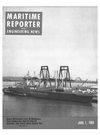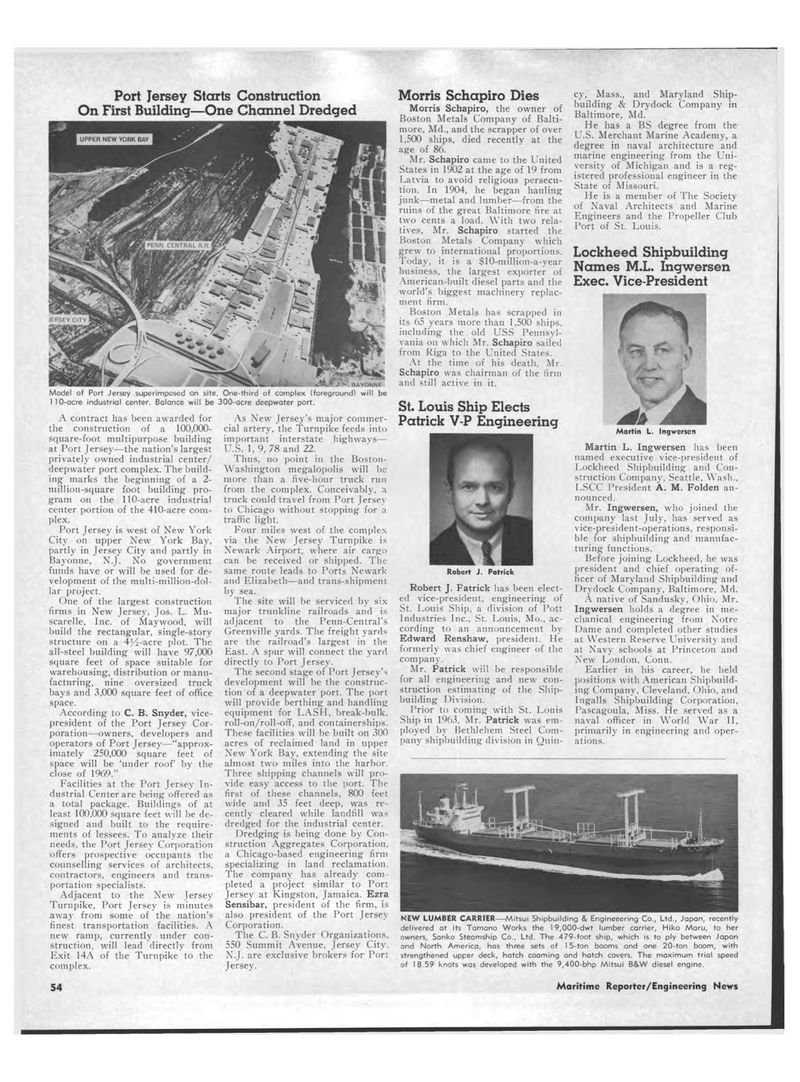
Page 52: of Marine News Magazine (June 1969)
Read this page in Pdf, Flash or Html5 edition of June 1969 Marine News Magazine
Port Jersey Starts Construction On First Building?One Channel Dredged UPPER NEW YORK BAY PENN. CENTRAL R.R. JERSEY CITY BAYONNF Model of Port Jersey superimposed on site. One-third of complex (foreground) will be 1 1 O-acre industrial center. Balance will be 300-acre deepwater port. A contract has been awarded for the construction of a 100,000-square-foot multipurpose building at Port Jersey?the nation's largest privately owned industrial center/ deepwater port complex. The build-ing marks the beginning of a 2-million-square foot building pro-gram on the 110-acre industrial center portion of the 410-acre com-plex. Port Jersey is west of New York City on upper New York Bay, partly in Jersey City and partly in Bayonne, N.J. No government funds have or will be used for de-velopment of the multi-million-dol-lar project. One of the largest construction firms in New Jersey, Jos. L. Mu-scarelle, Inc. of Maywood, will build the rectangular, single-story structure on a 4^2-acre plot. The all-steel building will have 97,000 square feet of space suitable for warehousing, distribution or manu-facturing, nine oversized truck bays and 3,000 square feet of office space. According to C. B. Snyder, vice-president of the Port Jersey Cor-poration?owners, developers and operators of Port Jersey?"approx-imately 250,000 square feet of space will be 'under roof by the close of 1969." Facilities at the Port Jersey In-dustrial Center are being offered as a total package. Buildings of at least 100,000 square feet will be de-signed and built to the require-ments of lessees. To analyze their needs, the Port Jersey Corporation offers prospective occupants the counselling services of architects, contractors, engineers and trans-portation specialists. Adjacent to the New Jersey Turnpike, Port Jersey is minutes away from some of the nation's finest transportation facilities. A new ramp, currently under con-struction, will lead directly from Exit 14A of the Turnpike to the complex. As New Jersey's major commer-cial artery, the Turnpike feeds into important interstate highways? U.S. 1, 9, 78 and 22. Thus, no point in the Boston-Washington megalopolis will be more than a five-hour truck run from the complex. Conceivably, a truck could travel from Port Jersey to Chicago without stopping for a traffic light. Four miles west of the complex via the New Jersey Turnpike is Newark Airport, where air cargo can be received or shipped. The same route leads to Ports Newark and Elizabeth?and trans-shipment by sea. The site will be serviced by six major trunkline railroads and is adjacent to the Penn-Central's Greenville yards. The freight yards are the railroad's largest in the East. A spur will connect the yard directly to Port Jersey. The second stage of Port Jersey's development will be the construc-tion of a deepwater port. The port will provide berthing and handling equipment for LASH, break-bulk, roll-on/roll-off, and containerships. These facilities will be built on 300 acres of reclaimed land in upper New York Bay, extending the site almost two miles into the harbor. Three shipping channels will pro-vide easy access to the port. The first of these channels, 800 feet wide and 35 feet deep, was re-cently cleared while landfill was dredged for the industrial center. Dredging is being done by Con-struction Aggregates Corporation, a Chicago-based engineering firm specializing in land reclamation. The company has already com-pleted a project similar to Port Jersey at Kingston, Jamaica. Ezra Sensibar, president of the firm, is also president of the Port Jersey Corporation. The C. B. Snyder Organizations, 550 Summit Avenue, Jersey City. N.J. are exclusive brokers for Port Jersey. NEW LUMBER CARRIER?Mitsui Shipbuilding & Engineeering Co., Ltd., Japan, recently delivered at its Tamano Works the 19,000-dwt lumber carrier, Hiko Maru, to her owners, Sanko Steamship Co., Ltd. The 479-foot ship, which is to ply between Japan and North America, has three sets of 15-ton booms and one 20-ton boom, with strengthened upper deck, hatch coaming and hatch covers. The maximum trial speed of 18.59 knots was developed with the 9,400-bhp Mitsui B&W diesel engine. mgMBKH Morris Schapiro Dies Morris Schapiro, the owner of Boston Metals Company of Balti-more, Md., and the scrapper of over 1,500 ships, died recently at the age of 86. Mr. Schapiro came to the United States in 1902 at the age of 19 from Latvia to avoid religious persecu-tion. In 1904, he began hauling junk?metal and lumber?from the ruins of the great Baltimore fire at two cents a load. With two rela-tives, Mr. Schapiro started the Boston Metals Company which grew to international proportions. Today, it is a $10-million-a-year business, the largest exporter of American-built diesel parts and the world's biggest machinery replac-ment firm. Boston Metals has scrapped in its 65 years more than 1,500 ships, including the old USS Pennsyl-vania on which Mr. Schapiro sailed from Riga to the United States. At the time of his death, Mr. Schapiro was chairman of the firm and still active in it. St. Louis Ship Elects Patrick V-P Engineering Robert J. Patrick Robert J. Fatrick has been elect-ed vice-president, engineering of St. Louis Ship, a division of Pott Industries Inc., St. Louis, Mo., ac-cording to an announcement by Edward Renshaw, president. He formerly was chief engineer of the company. Mr. Patrick will be responsible for all engineering and new con-struction estimating of the Ship-building Division. Prior to coming with St. Louis Ship in 1963, Mr. Patrick was em-ployed by Bethlehem Steel Com-pany shipbuilding division in Quin-cy, Mass., and Maryland Ship-building & Drydock Company in Baltimore, Md. He has a BS degree from the U.S. Merchant Marine Academy, a degree in naval architecture and marine engineering from the Uni-versity of Michigan and is a reg-istered professional engineer in the State of Missouri. He is a member of The Society of Naval Architects and Marine Engineers and the Propeller Club Port of St. Louis. Lockheed Shipbuilding Names M.L. Ingwersen Exec. Vice-President Martin L. Ingwersen Martin L. Ingwersen has been named executive vice-president of Lockheed Shipbuilding and Con-struction Company, Seattle, Wash., LSCC President A. M. Folden an-nounced. Mr. Ingwersen, who joined the company last July, has served as vice-president-operations, responsi-ble for shipbuilding and manufac-turing functions. Before joining Lockheed, he was president and chief operating of-ficer of Maryland Shipbuilding and Drydock Company, Baltimore, Md. A native of Sandusky, Ohio, Mr. Ingwersen holds a degree in me-chanical engineering from Notre Dame and completed other studies at Western Reserve University and at Navy schools at Princeton and New London, Conn. Earlier in his career, he held positions with American Shipbuild-ing Company, Cleveland, Ohio, and Ingalls Shipbuilding Corporation, I'ascagoula, Miss. He served as a naval officer in World War II, primarily in engineering and oper-ations. 54 Maritime Reporter/Engineering News

 51
51

 53
53
